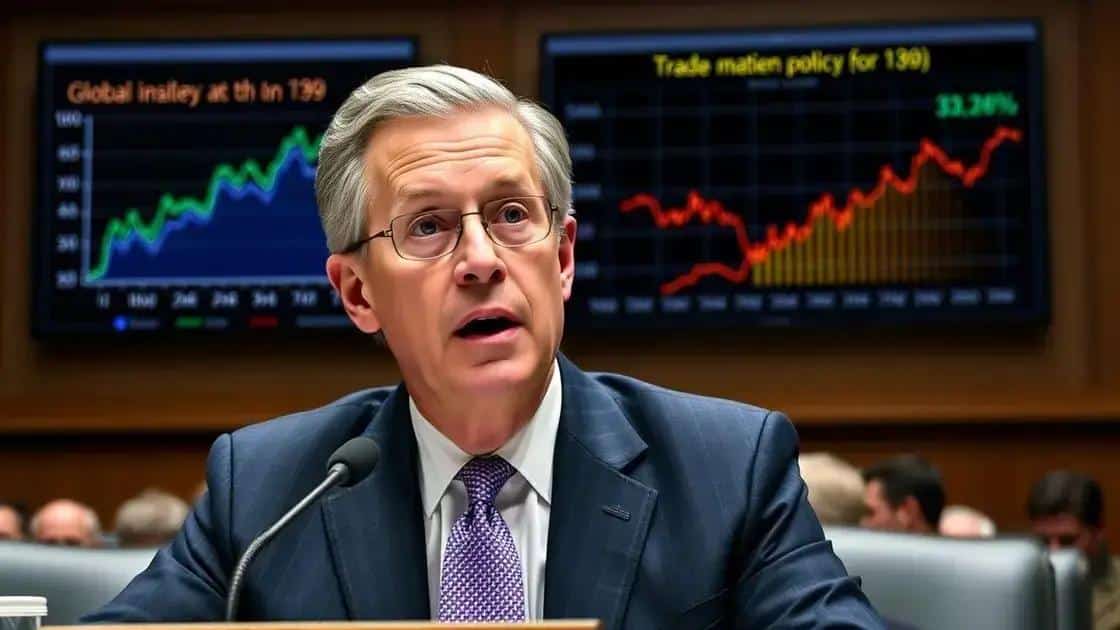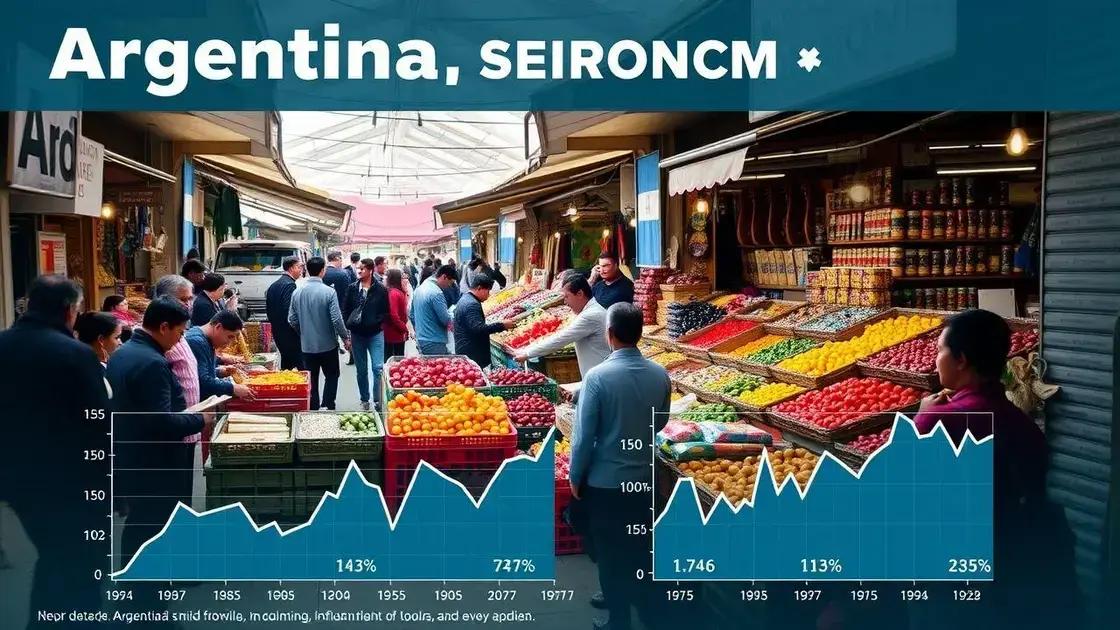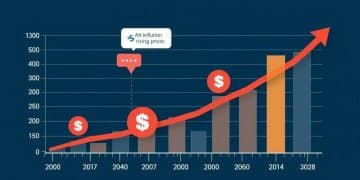Market outlook analysis: Bessent’s insights on trade

Anúncios
Argentina’s economic situation, marked by high inflation and recurrent debt crises, significantly impacts both its citizens and global trade dynamics, creating challenges and opportunities in international markets.
Market outlook analysis: Bessent weighs in on trade is essential reading for anyone trying to navigate the complexities of today’s economy. How do trade dynamics, central banking, and international relations intertwine? Let’s delve into these vital issues together.
Anúncios
Understanding the current trade landscape
Understanding the current trade landscape is crucial for grasping how global markets operate. By analyzing this sector, we can learn about the factors influencing trade relationships and the implications for various economies.
The role of trade agreements
Trade agreements play a vital part in shaping the current landscape. These agreements simplify the exchange of goods and can boost the economy.
Anúncios
- Reducing tariffs on imports
- Enhancing market access for exporters
- Encouraging foreign investment
In recent years, we’ve seen a shift in the dynamics of trade agreements. Nations are reevaluating their partnerships and seeking more favorable terms. It’s also essential to consider the impact of economic tensions that can arise from renegotiations or the introduction of tariffs.
Impact of technology on trade
Technology is transforming how countries conduct trade. Innovations like blockchain and artificial intelligence streamline processes, making transactions faster and more secure. Companies can now track shipments in real-time, which improves efficiency.
Moreover, e-commerce has changed consumer behavior. People now expect products to reach them quickly. This shift prompts businesses to adapt their supply chains to meet these demands.
Lastly, understanding demographic trends is crucial. Different age groups have varying purchasing habits. For example, millennials may prefer sustainable products, altering how companies position themselves in the market.
Global economic influences
The economy’s state around the world significantly affects trade. Factors like inflation, unemployment rates, and currency fluctuations can determine how nations trade with each other. A strong economy typically leads to increased demand for goods.
- Inflation can raise import costs
- Currency strength affects international purchasing power
- Unemployment may reduce domestic spending
As the global economy evolves, it’s essential to stay informed about these influences, as they can shift trade landscapes and create new opportunities or challenges.
Impact of Powell’s policies on trade

The impact of Powell’s policies on trade is significant in today’s economic landscape. As the Chairman of the Federal Reserve, Jerome Powell’s decisions on interest rates and monetary policy directly influence the flow of goods and services globally. These policies can either stimulate or hinder trade depending on the economic environment.
Interest rates and their effects
When Powell adjusts interest rates, it can change borrowing costs for businesses. Lowering rates usually encourages spending and investment. This, in turn, leads to increased demand for imports. Conversely, higher rates can restrict borrowing, leading to decreased economic activity.
- Lower interest rates promote imports
- Higher rates may slow down economic growth
- Changes in investment affect trade volumes
Businesses planning to expand may find lower rates beneficial for financing their growth. This can create a ripple effect on trade as increased production leads to higher demand for raw materials from other countries.
Federal Reserve communications
Additionally, Powell’s communications regarding policy changes can impact market confidence. When markets perceive a strong commitment to controlling inflation or supporting economic recovery, it can influence investment and spending behavior in international markets.
The way Powell communicates these strategies can lead to fluctuations in the dollar’s value. A strong dollar makes U.S. exports more expensive and imports cheaper. This situation can impact trade balances significantly.
Long-term implications of trade policies
Powell’s approach not only affects immediate trade flows but also shapes long-term economic trends. Trade agreements and relationships can evolve based on perceptions of U.S. economic stability influenced by Federal Reserve policies.
- Stable economic policies attract foreign investment
- Uncertainty may lead to reduced trade partnerships
- Long-term trade agreements can shift based on economic signals
Businesses and governments must closely monitor Powell’s policies to anticipate their effects on trading conditions and prepare for potential adjustments in their strategies.
The dollar’s role in global markets
The dollar’s role in global markets is pivotal for international trade and finance. As the world’s primary reserve currency, the U.S. dollar influences trade flows, investments, and exchange rates worldwide.
Significance as a reserve currency
Central banks around the world hold dollars as part of their foreign exchange reserves. This status allows countries to stabilize their own currencies and manage inflation.
- Facilitates international trade transactions
- Reduces exchange rate risks for businesses
- Acts as a safe haven during economic uncertainty
Having the dollar as a reserve currency provides confidence to governments and businesses when engaging in cross-border trade. This confidence helps to foster a stronger economic environment.
The dollar’s influence on commodities
The pricing of commodities like oil and gold in dollars means that fluctuations in the dollar’s value can significantly impact global commodity markets. When the dollar strengthens, commodities become more expensive for other countries.
This situation can lead to decreased demand in regions with weaker currencies, creating ripples throughout the global economy. Therefore, changes in the dollar’s value can result in shifts in consumption patterns worldwide.
Trade deficits and currency value
Another key aspect is the relationship between the dollar, trade deficits, and currency valuation. A strong dollar often correlates with larger trade deficits, as U.S. goods become pricier for foreign buyers.
- Weak dollar boosts exports
- Strong dollar may decrease competitiveness
- Currency valuation affects trade balances
Understanding how the dollar’s performance impacts trade is essential for businesses and policymakers. They must adapt their strategies based on these economic signals to navigate the global marketplace effectively.
Argentina’s economic situation and its implications

Argentina’s economic situation and its implications are complex and multifaceted. The country has faced a range of economic challenges, from inflation to debt crises, that impact not only its citizens but also global markets.
High inflation rates
One of the most pressing issues in Argentina is its high inflation rate. Prices have soared, making it difficult for people to afford basic goods. This situation erodes purchasing power and can lead to social unrest.
- Inflation affects savings and investments
- Higher costs impact daily living
- Uncertainty can deter foreign investment
The government has struggled to implement effective strategies to combat this inflation. Efforts to stabilize prices often lead to economic policies that can create further challenges.
Debt and economic management
Argentina has a long history of debt crises. It has defaulted on loans multiple times, which complicates its ability to engage with international lenders. This creates a significant barrier to economic growth.
Efforts to renegotiate debt terms can be beneficial, but they also come with strict conditions that may affect domestic policies. The ongoing struggle for economic stability can hinder the government’s ability to invest in essential services.
Impact on trade relations
The economic situation in Argentina can influence its trade relations. Countries may hesitate to engage in trade agreements if they perceive instability. This can limit Argentina’s access to goods and capital.
- Unstable economies often struggle to attract trade
- Export capabilities are affected by domestic issues
- Trade partners assess risks before agreements
As Argentina continues to navigate its economic landscape, understanding these dynamics is crucial for not only its citizens but also international stakeholders who may rely on Argentine goods and services.
FAQ – Frequently Asked Questions about Argentina’s Economic Situation
What are the main causes of Argentina’s high inflation?
High inflation in Argentina is primarily caused by economic mismanagement, excessive money printing, and fluctuating currency value.
How does Argentina’s debt crisis affect its economy?
Argentina’s recurring debt crises lead to loss of investor confidence, difficulty in obtaining loans, and constraints on government spending, which hampers economic growth.
What impact does inflation have on daily life in Argentina?
Inflation erodes purchasing power, making basic goods and services more expensive, which can lead to increased poverty and decreased quality of life.
How does Argentina’s economic instability affect global markets?
Argentina’s economic instability can influence global commodity prices and trade alliances, impacting countries that rely on Argentine exports.






